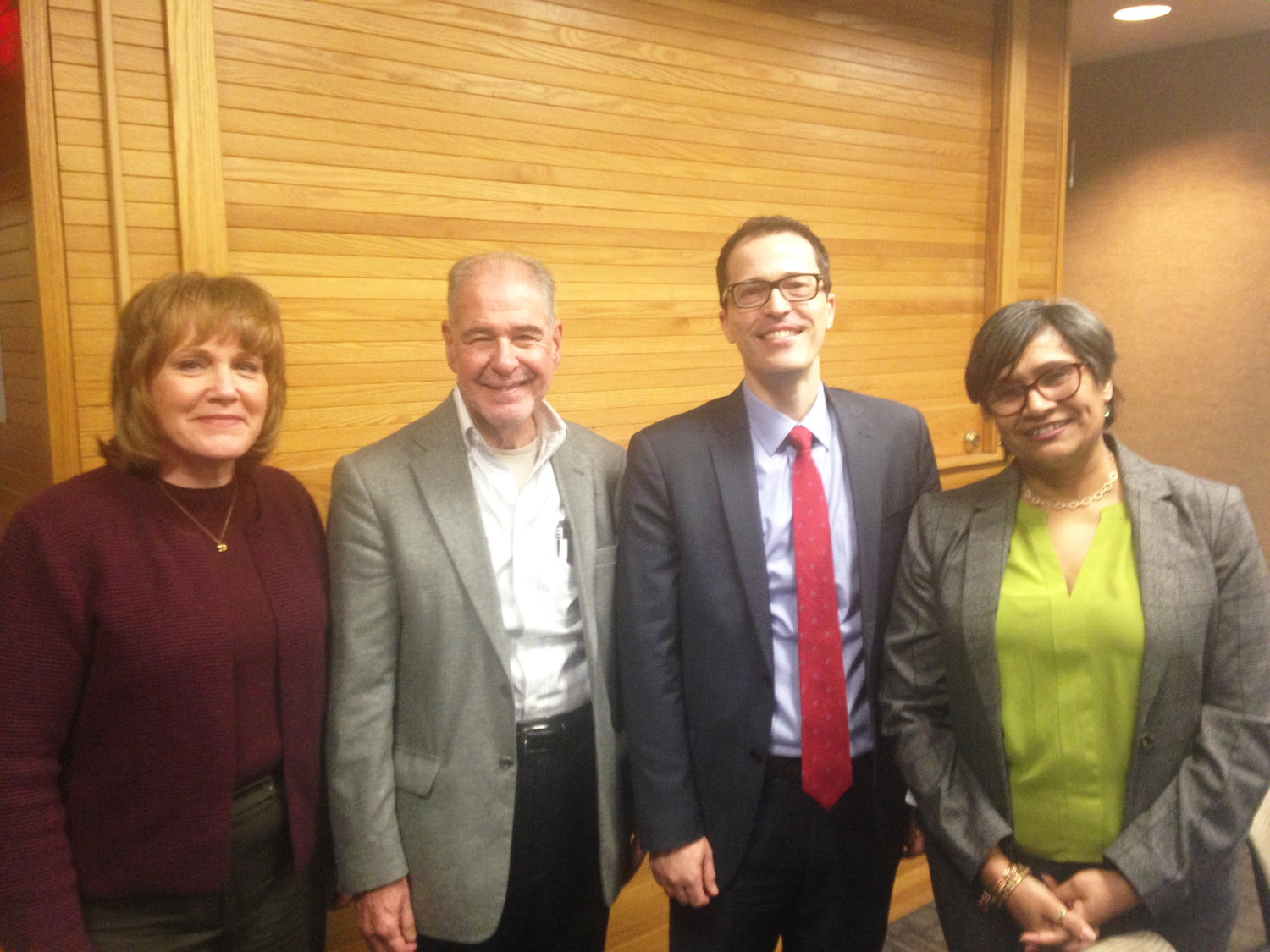Will success in tackling the opioid epidemic by Raimondo become key message in upcoming campaign?
The most recent Task Force on Overdose Prevention and Intervention reported on numerous successes in the ongoing efforts
PROVIDENCE – There were few if any discouraging words to be heard at the most recent meeting of the Governors Task Force on Overdose Prevention and Intervention held on Wednesday, Feb. 14, at which Gov. Gina Raimondo personally announced the results of new study tracking the success of medication assisted treatment for inmates, which found that there had been a 61 percent reduction in post-incarceration overdose deaths.
The study, conducted by researchers from Brown University and the University of North Carolina at Chapel Hill and published by the Journal of the American Medical Association Psychiatry, compared the first six months of the new program launched in 2016 with the six months prior to implementation.
There were more than 100 people in attendance at the Task Force meeting, which, for the first time, opened up the two Department of Administration meeting rooms to accommodate the overflow crowd.
Dr. Jennifer Clarke gave an update on the inmate medication assisted treatment program being managed by the R.I. Department of Corrections.
The Journey To Hope, Health & Healing, Inc., with facilities Johnston, Providence and Westerly, received the most recent designation as a Rhode Island Center of Excellence.
Eric Beane, the secretary of the R.I. Executive Office of Health and Human Services, gave a brief talk about the importance of the work of the Task Force, previewing his op-ed which appeared in The Providence Journal on Friday, Feb. 16, with the headline: “R.I. is disrupting its opioids crisis.”
Representatives from RICARES introduced the upcoming community conversation about Medically Supervised Consumption Centers, to be held on March 1 at the Warren Alpert Medical School of Brown University.
[There is still no public statewide harm reduction strategy document, despite it being one of the items tasked to the Task Force in the July 12, 2017, executive order by Gov. Raimondo. There appears to be an internal divide in the balance between harm reduction and medication assisted treatment. Sources told ConvergenceRI that a sub-committee of the Task Force will be taking up harm reduction strategies in the near future, a decision not yet shared publicly.]
Susan Storti gave an update on the Opioid Treatment Health Homes, including the Addiction Recovery Institute, the Center for Treatment and Recovery, CODAC, Recovery House, and the Journey to Hope, Health and Healing.
Tom Coderre, the newly appointed member of Gov. Raimondo’s senior staff to be the point person on efforts to address the opioid epidemic, spoke briefly about coming back home to work for the Governor.
Rebecca Boss, director of the R.I. Department of Behavioral Healthcare, Developmental Disabilities and Hospitals, praised the ongoing documentary on the opioid crisis being done by ABC6 news. She also praised the story in The Providence Journal about the rollout of the Safe Stations program in Providence, through 12 fire stations became points of entry for people wanting to seek treatment for substance use disorders.
[Two other Rhode Island TV networks, WJAR Channel 10 and Rhode Island Public Television, Channel 36, are also involved in producing documentaries on the opioid epidemic in Rhode Island. Attending the Task Force meeting had the feel, in ConvergenceRI’s opinion, of being an unwitting participant in a future Raimondo re-election campaign advertisement.]
Indeed, Raimondo was one of 30 experts queried by The New York Times in a story that was published on Wednesday, Feb. 14, to discuss how they might spend $100 billion in federal funds to address the ongoing opioid epidemic. [So, too, were Brandon Marshall of the Brown University School of Public Health and sociologist Shannon Monnat from Syracuse University.]
Toward the end of the meeting, State Sen. Joshua Miller asked Traci Green to give the Task Force an update on the fentanyl testing strip study she co-authored, which had been released on Monday, Feb. 5, coordinated by the Bloomberg American Health Initiative at Johns Hopkins University.
A few polite but discouraging words
Jonathan Goyer, who directs the mobile outreach program at Anchor Recovery Community Center, followed Green’s update by making two suggestions, in his usual direct and honest fashion. The first was not to forget about cocaine and its growing use in Rhode Island, a drug that is often contaminated with fentanyl. Cocaine, he repeated loudly.
Goyer also said that it was important to pay attention to the fact that many who might be seeking out medical treatment for addiction were hindered by the lack of health insurance.
Neonatal abstinence syndrome
On Friday, Feb. 16, Raimondo also announced that the National Governors Association had selected Rhode Island to be one of five “learning lab” states to develop a strategic action plan to reduce neonatal abstinence syndrome, or NAS, also known as neonatal withdrawal.
Dr. Barry Lester, who oversees the Women & Infants program and is the director at the Brown Center for the Study of Children at Risk, spoke at the event.
Lester was featured in a ConvergenceRI story, “Shining a bright light on extraordinary research talent,” which talked about his work to develop a new diagnostic tool for a more reliable and systemic way to identify NAS, based upon a sophisticated acoustic system and database to track and analyze the cries of infants. The effort seeks to develop an automated, hand-held, iPhone like device. [See link to story below.]
Surprisingly, no one at the news conference seemed to be aware of Lester’s research on the new diagnostic tool.






